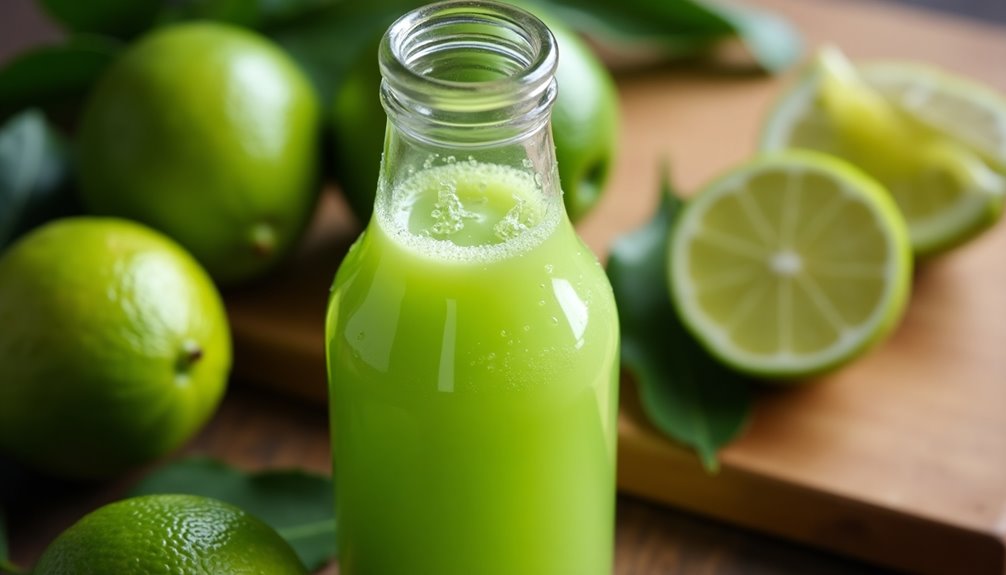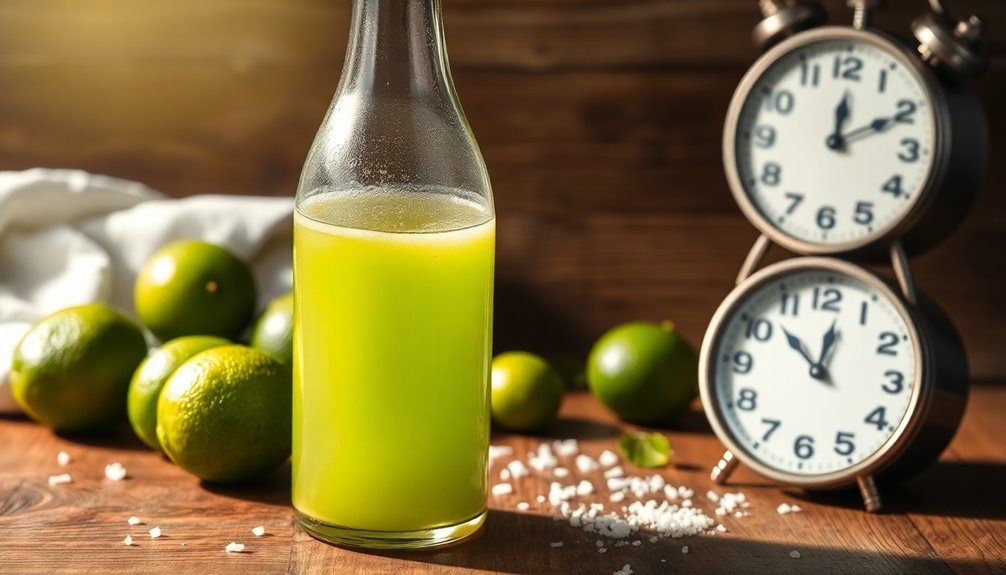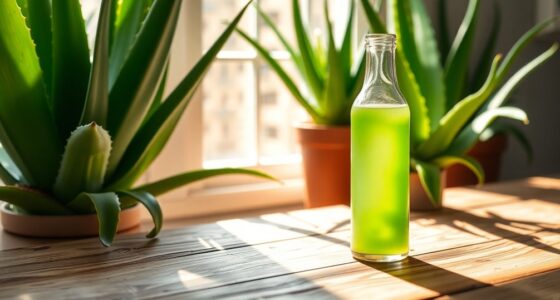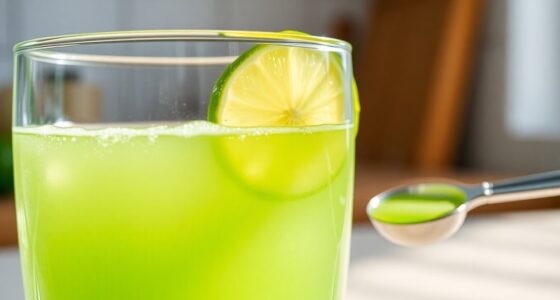Fresh lime juice is good for about 2-3 days in the fridge. After juicing, it tastes best within 6 hours due to flavor loss over time. Store-bought lime juice can last several months unopened, but once opened, you should use it within 1-2 weeks for optimal quality. To extend shelf life, consider freezing your juice. If you're curious about storage tips and signs of spoilage, keep going to find more helpful details!
Key Takeaways
- Fresh lime juice lasts about 2-3 days in the refrigerator and optimal flavor is within 6 hours of juicing.
- Store-bought lime juice can last several months unopened, but should be used within 1-2 weeks once opened.
- Refrigeration is essential for both fresh and opened store-bought lime juice to maintain quality.
- Freezing lime juice extends its shelf life up to four months, making it convenient for later use.
- Always check for signs of spoilage, like off odors or mold, before consuming lime juice.

When it comes to lime juice, freshness is key. You want the vibrant flavor of fresh lime juice to elevate your dishes and drinks. However, understanding how long lime juice lasts can save you from using spoiled ingredients. Freshly squeezed lime juice typically lasts for about 2-3 days when stored in the refrigerator. If you want to enjoy its optimal flavor, aim to use it within 6 hours of juicing. After that, the acidity helps preserve the juice to some extent, but the taste starts to diminish.
If you're considering store-bought lime juice, you'll find that it has a different shelf life. Unopened bottles can last for several months past their expiration date, thanks to preservatives. However, once you open that bottle, try to use it within 1-2 weeks for the best quality. Remember to refrigerate it after opening; this will help keep the flavor intact for a little longer. Just keep in mind that while store-bought juice is convenient, it often lacks the bright, zesty taste of fresh juice.
Storing lime juice properly is essential to maximizing its freshness. If you find yourself with leftover fresh lime juice, consider pouring it into an airtight container before placing it in the refrigerator. This minimizes exposure to air, which can cause the juice to spoil faster.
Always check for signs of spoilage before using any lime juice. Off odors, a bland or bitter taste, or the presence of mold or strange particles are indicators that your juice has gone bad. If you notice any of these signs, it's best to discard it for safety's sake.
For longer storage, frozen lime juice can be a game-changer. If you want to extend your lime juice's shelf life, freeze it in airtight containers or ice cube trays. This method keeps the juice fresh for up to four months.
When you need some lime juice, simply pop out a cube or two and let it thaw in the refrigerator or at room temperature. This way, you can enjoy the taste of fresh lime juice even when you don't have fresh limes on hand.
Frequently Asked Questions
Can Lime Juice Go Bad?
Yes, lime juice can definitely go bad. If you leave it exposed to air and light, it can develop off smells and bitter flavors.
Freshly squeezed lime juice is best consumed within 24 hours for the best taste. Once you open a bottle of store-bought juice, it should be refrigerated and used within 1-2 weeks.
Always check for strange odors, taste changes, or mold before using any lime juice to ensure it's safe.
How Long Does Bottled Key Lime Juice Last in the Fridge?
When you crack open a bottle of key lime juice, think of it as finding treasure in a pirate's chest.
In the fridge, your bottled key lime juice lasts about 6-8 weeks after opening for the best flavor and quality.
If it's unopened, you can enjoy it for 12-18 months in a cool, dark place.
Just keep an eye out for spoilage signs—trust your senses to guide you!
How to Store Lime Juice in the Fridge?
To store lime juice in the fridge, pour it into an airtight container right after juicing. This helps keep out air and prevents oxidation.
Make sure you seal the container tightly to maintain its freshness and avoid contamination.
For the best flavor, try to use freshly squeezed lime juice within 2-3 days.
If you have extra juice, freeze it in ice cube trays for longer storage, which can last up to four months.
How Long Does Lime and Lemon Juice Last?
Lime and lemon juice can vary in shelf life depending on how you store them.
If you squeeze them fresh, expect them to last about 2-3 days for lime juice and 1-4 days for lemon juice in the fridge.
If you've got store-bought juice, it can last several months unopened, but once opened, use it within 1-2 weeks.
To extend freshness, consider freezing them in ice cube trays for up to three months.
Conclusion
So, next time you squeeze fresh lime juice, remember: it can last about 2 to 3 days in the fridge, but its vibrant flavor starts to fade quickly. Picture that zesty green liquid slowly losing its punch, just waiting to be mixed into your favorite dish or cocktail. Don't let it sit too long—use it up and savor every drop! The clock's ticking, and that refreshing burst of lime is just a squeeze away from being gone.
Cindy thoroughly researches juicing trends, techniques, and recipes to provide readers with practical advice and inspiration. Her writing style is accessible, engaging, and designed to make complex concepts easy to understand. Cindy’s dedication to promoting the advantages of juicing shines through her work, empowering readers to make positive changes in their lives through the simple act of juicing.











